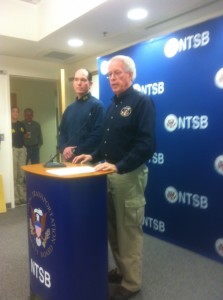
NTSB member Earl Weener addresses the media in the days after the Metro-North collision in Bridgeport.
The NTSB has cancelled an upcoming investigative hearing as a result of the government shutdown.
As a result of the ongoing government shutdown, federal transportation inspectors planning a hearing on the two Metro-North accidents in May on the New Haven Line have called off a planned two day hearing next week.
The hearing will be rescheduled for at an “appropriate date,” according to a brief announcement on the NTSB’s Web-site.
More than 20 representatives from Metro-North, government, industry, and rail workers were scheduled to testify on four different topic areas during the hearing into the May 17 derailment of a M-8 commuter train and collision with another which resulted in more than 70 people being injured.
Two weeks after that accident, a 52-year-old track foreman in West Haven was killed by a train.
The four areas the NTSB’s inquiry would cover were track maintenance and inspection, railroad passenger car crash worthiness;operational protection of on-track areas; and the organizational safety culture of Metro-North.
Before the shutdown began October 1, the state’s Congressional delegation had called for the agency to expedite their investigation into the final causes of the accidents, while the agency said that it will take about a year to complete their investigations.
Federal investigators have focused on track maintenance and failure in their investigation of the Bridgeport derailment and crash, taking a section of broken rail secured by rail joint bars in the area to their Washington metallurgy lab for analysis.
A preliminary report from the NTSB cited an inspection of the piece of track done by Metro-North two days before the crash that found that crushed stone and other material under an insulated rail joint moved out of alignment when it was traveled over. The NTSB report did not offer information on whether Metro-North addressed the condition between the May 15 inspection and the accident two days later.
NTSB estimates that 250 people were on each train at the time of the incident.
In the West Haven fatality on May 28, Luden was struck and killed by a Metro-North passenger train traveling 70 mph after a student controller reopened the track where he was working without the approval of his senior supervisor.
Luden had requested the section of track be taken out of service for maintenance.
In the wake of the derailment and death of Luden Metro-North has hired Technology Transportation Center Inc., a Colorado-based rail safety consultant the railroad to vet all of Metro-North’s tracks for subsurface flaws using more in-depth technologies including ground-penetrating radar and track geometry cars.
In response to an NTSB recommendation, the railroad is running a pilot program using so-called shunt devices in tandem with the railroad’s signal system on track areas where workers are to keep trains out of track areas that are out of service.